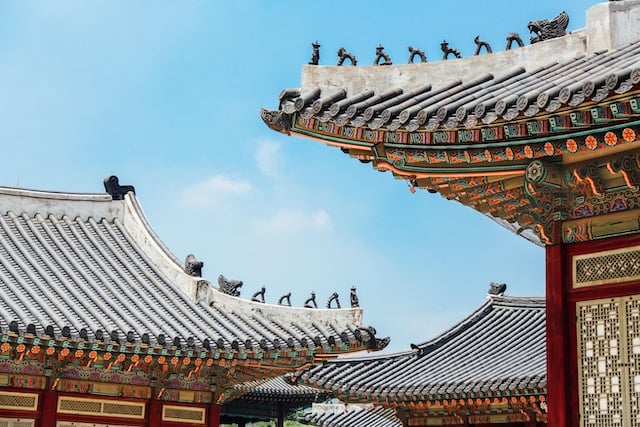Doing business in South Korea in 2023

According to the latest World Bank annual ratings in 2023, South Korea has maintained its strong position as the 5th best country out of 190 world economies for ease of doing business. This accomplishment marks the fifth consecutive year, starting from 2019, that South Korea has held the 5th rank, showcasing its sustained commitment to fostering a business-friendly environment.
In recent years, the Ease of Doing Business in South Korea has undergone significant changes compared to the data reported between 2008 and 2019. From 2020 to 2023, the country has witnessed a remarkable improvement in its business climate. The average Ease of Doing Business index, which had been consistently at 8.75 from 2008 to 2019, experienced a substantial surge. It reached an all-time high of 92 in 2023, showcasing the government's commitment to implementing business-friendly policies. This remarkable progress marks a stark contrast to the record high of 23 in 2008 and the record low of 4 in 2014. South Korea's efforts in fostering a conducive environment for businesses have undoubtedly paid off, propelling the nation to one of the top-ranking countries for ease of doing business globally.
This page comprises a chart having chronological data for Ease of Doing Business in South Korea, i.e., factual data, historic graph and – with its last amendment in July 2023.
Registration and Establishment
For setting up a business in the form of a joint-stock company, there are many conditions that need to be met. The most important ones among these for setting up a joint-stock company:
- Draft pieces of incorporation (instruments).
- Signing up of shares by the facilitator(s) and other subscriber(s).
- Remittance of the subscription amount.
- Analysis by the directors and legal auditors on if the incorporation has complied with the applied regulations and the instruments and investigation by the court-appointed inspector (as relevant) into if any constituents of unusual incorporation, for example, promoters' special entitlements, benefits in kind and transferred assets ahead of time, have been appropriately evaluated and taken care of, as per the proper regulations.
- Nomination of the director(s) and corporate auditor(s).
- Registration of the incorporation at a capable commercial registry. Filling of this must essentially happen not later than 2 weeks following the date of completion of the investigation of the constituents of unusual incorporation and any procedure of change that follows.
The next step is to acquire a business registration certificate from the local tax office.
For more information on registration requirements, see www.iros.go.kr.
Overseas Investment
Foreign investment is more intense in specific sectors like:
- Food grain farming (rice and barley)
- Meat wholesale (partial)
- Electricity generation (partial)
- Nuclear fuel processing
- Radio and ground-level television communications. Investments in different types of broadcasting are partial permission.
- Telecommunications (partial).
- Issue of newspapers, journals and publications (partial).
- Passenger transportation and transport of goods (partial).
The reporting of foreign investment must take place within the ambit of the Foreign Investment Promotion Act (FIPA), if not within the ambit of the Foreign Exchange Transaction Act.
A quicker procedure of registration can be availed by Foreign Direct Investments (FDI) within the framework of FIPA. For filing of applications, an FDI:
- Must have a minimum of 10% of voting shares of a Korean enterprise or set up a business liaison with a Korean company; and
- Must have a minimum investment of KRW100 million.
No special restrictions apply to international shareholders after successful foreign investment has materialized.
Grants or Incentives for Investors
Local enterprises that are fueled by foreign investment in specific high-tech sectors, specified in the Special Tax Treatment Act (or doing business in certain industrial estates marked by the Foreign Investment Promotion Act are eligible for certain tax waivers or allowances along with the corporate income tax, the personal income tax, customs duty, VAT, acquisition taxes and property taxes for a fixed term and may receive a cash grant and site location support.
Types of Business Setups
According to the Commercial Code, the main types of business setups in South Korea are:
- Partnership Company (hapmyeong hoesa).
- Limited Partnership Company (hapja johap).
- Limited Liability Company (yuhan chaegim hoesa).
- Stock Company (jusik hoesa).
- Limited company (yuhan hoesa).
The Capital Market and Financial Investment Business Act also offers an investment trust.
The most widespread type of business setup that foreign companies choose for is a stock company (jusik hoesa). A limited liability company (yuhan hoesa) is also a favorite among foreign companies because of:
- Its lower legal provisions
- Straightforward process of incorporation and framework of corporate administration.
Double Tax Treaties
South Korea has inked tax treaties with several countries exceeding 80 comprising the US, Japan, Germany, France, Italy and the UK.
Interest, dividends and royalties paid to a foreign enterprise without a South Korean business place will attract maximum withholding tax rates, according to the double tax treaties that apply.
Data Security
The rules pertaining to data protection are as follows:
- The Personal Information Protection Act. This Act rules gathering and processing of information by government agencies and government enterprises and also commercial institutions, private entities and persons.
- The Act on the Promotion of Use of Electric Communication Networks. This is applicable to personal information collection and processing essential to telecommunications service providers and specifically related business entities.
- The Act on the Use and Protection of Credit Information and the Act on the Use and Protection of Information on Location. These Acts safeguard privacy and disallow the misapplication of personal data on credit and location.
- The Act on Real Name Financial Transactions and Guarantee of Secrecy. This regulates the safety of privacy of financial transactions.
- The Act on Consumer Protection in Electronic Commerce. This Act ensures the correct usage of consumer data gathered via e-commerce transactions.
- The Cloud Computing Development and User Protection Act. This standardizes cloud computing and has legal provisions to safeguard user data.
Recent Developments
Following are the most important changing circumstances that South Korea has experienced:
- The Act on Prohibition of Improper Solicitation and the Provision/Receipt of Money and Valuables (Kim Young-Ran Law) was rendered functional on 28 September 2016. It launched penal liability for the provision of cash and valuables to a civil servant (even though money and valuables have nothing to do with the civil servant's duties) if certain limits (KRW1 million for every individual occurrence, or KRW3 million overall, per year) surpass limits. The range of those considered to be government officials within the ambit of this law has been greatly expanded, inclusive of persons who perform public duties as per the law, for instance, journalists, teaching staff and spouses of public officials.
- The South Korean Government is on to submit an amendment bill with regard to class actions. Based on the amendment bill, an extra five types (products, fair trade, advertisements, public information, and food) of class actions will be allowed. At present, except for investors in securities, none can file class actions.
- Based on the modified Act on Promotion of Information and Communications Network Utilization and Information Protection, a big foreign company that has a liaison office in South Korea mandatorily has to hire an agent (person) for communicating with government agencies and to take care of filing of complaints, or requests for submissions.
- As per the presently amended Labour Standards Act, the highest number of business hours every week was brought down from 68 hours to 52 hours.
An Optimistic Economy
South Korea's economy experienced significant fluctuations in the years 2020 to 2023 due to various factors. The country saw a temporary deviation in 2020 as trade conflict tensions eased and extensive fiscal and economic practices were implemented. However, stringent regulations and rising labor costs continued to curb growth throughout this period.
In 2020, the Bank of Korea projected a 2.4% increase in gross domestic product, which was higher than the expected 2.0% rise in 2019. Private sector economists, including those at JPMorgan, also made comparable predictions with a forecast of a 2.3% rise.
Economists like Park Seok-gil at JPMorgan in Seoul predicted that external demand drags would gradually ease, and fiscal and monetary stimulus would act as shock-absorbers for domestic demand.
The central bank responded to the economic conditions by making adjustments to the criterion rate, reducing it by 25 basis points to 1.0% in 2020.
President Moon Jae-in's administration implemented an acute hike in the minimum wage for two consecutive years after coming to power in 2017. While this move positively impacted low-wage earners, entrepreneurs struggled with the additional labor costs. Despite these challenges, the country's stock market remained relatively stable and even showed signs of growth in 2020.
According to CW Chung, a senior analyst at Nomura, business profits rose by 22% in 2020, supported by strong performances from multinational companies like Samsung Electronics, SK Hynix, and LG Chem.
The memory and memory supply chain sectors experienced a positive outlook in 2020, rebounding from the third-quarter low of 2019. Additionally, other cyclical industries, such as chemicals, steel, oil refining, LCD, and overseas engineering and construction, went through mini-recovery cycles in 2020.
In its December half-yearly report, the Ministry of Economy and Finance stated that South Korea, a significant player in world trade and technology, witnessed a strong revival of exports in 2019, driven by active demand for semiconductors. The ministry also projected that South Korean exports would grow by 3% in 2020 compared to the previous year, which had seen an 11% reduction in exports.
What South Korea Offers
As of 2023, South Korea remains an enigmatic opportunity for global firms, and its potential might still be underestimated. While it used to have a relatively closed economy, recent developments have shown signs of increased openness and engagement with the global market. Despite the language and cultural challenges that once made it seem impenetrable, the country has taken significant steps to enhance its business environment and attract foreign investment.
For adventurous entrepreneurs, the South Korean market now offers even more enticing growth prospects and serves as a lucrative Launchpad to the thriving Northeast Asian markets. Success is still achievable for those who are efficient and prioritize quality in their ventures.
However, it's important to note that certain challenges persist. While hiring, marketing, and brand building have evolved beyond informal networks, entering the market may still present obstacles. But for those who successfully navigate these hurdles, the rewards include access to one of the world's most booming economies. South Korea continues to boast a well-qualified, diligent, and determined workforce, making it an attractive destination for collaboration with some of the biggest and rapidly growing international establishments.
Conclusion
South Korea is taking rigorous steps to minimize legislations in the effort to bring more ease of access for both, overseas and domestic companies. The country has come up to carve a niche among the 10 topmost business-friendly economies in the world.
To know more about the 2023 prospects of doing business in South Korea, contact us below.
.png?width=1656&height=121&name=rsz_%EB%A1%9C%EA%B3%A0%ED%88%AC%EB%AA%85%20(8).png)

